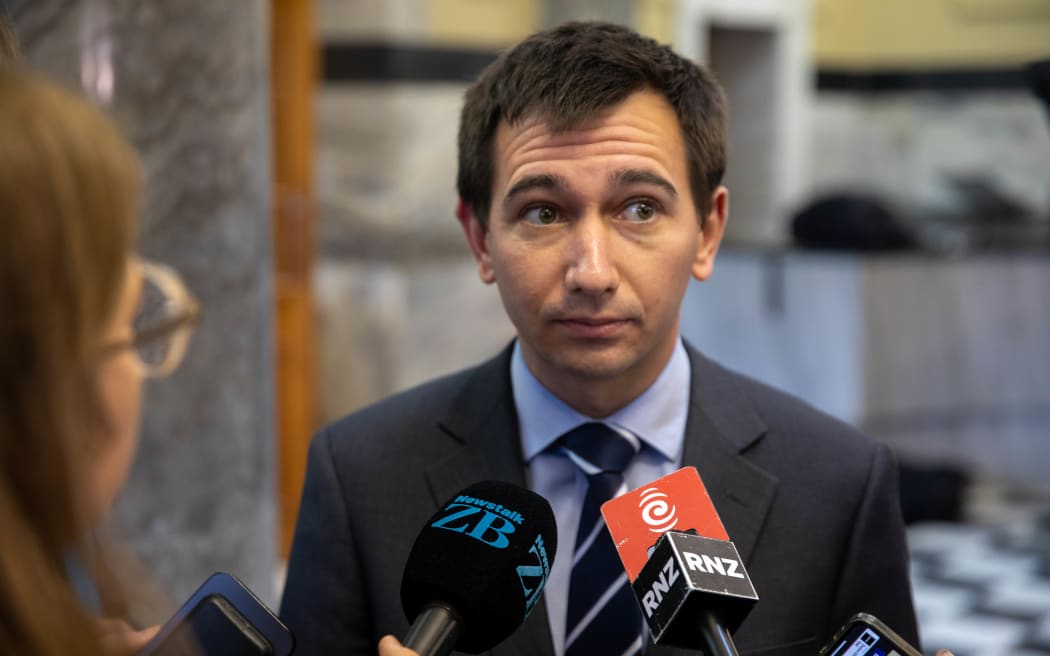
Photo: RNZ
Petrol cars could start being hit with road user charges (RUCs) as early as 2027, as the government begins its overhaul of land transport funding.
Road construction and maintenance is funded through the National Land Transport Fund (NLTF), which is largely made up of revenue from petrol taxes, and RUCs paid by drivers of electric and diesel vehicles.
Speaking at the Building Nations conference in Auckland on Thursday, Transport Minister Simeon Brown announced a roadmap for moving all light vehicles to the RUC system and away from fuel tax.
According to the new Revenue Action Plan, legislation would be progressed next year with a "possible" start date for the petrol car shift-over set for 2027.
Improvements would be made to the system through 2026 in preparation.
Brown said the transition would ensure all road users - regardless of their vehicle - were contributing fairly to road upkeep.

File photo. Simeon Brown said consultation would soon begin on tolling proposals for the Manawatū Gorge, Takitimu North Link and Ōtaki to north of Levin. Photo: RNZ / REECE BAKER
"When users pay for a service, they aren't just participants. They become customers, and customers naturally expect and demand the highest level of service."
It was not clear when or how petrol taxes might be phased out, given the government had earlier signalled a 12 cent tax hike in 2027.
Queried on the point, Brown told RNZ the detailed timing had yet to be finalised.
Automobile Association policy director Martin Glynn told RNZ the existing petrol tax approach penalised people with less fuel-efficient vehicles, meaning the new system should be fairer.
But the RUC system would first require a major upgrade and 2027 was an "ambitious date", he said.
"It's going to be a huge exercise moving our petrol fleet - slightly over three-quarters of the national fleet - on to Road User Charges."
Glynn said the government appeared keen to implement an electronic system with units in cars measuring their road use, but that would pose its own difficulties.
"People are likely to have concerns with vehicles being tracked and what the data's being used for and all sorts of things," he said.
"That could enable charging for other purposes, like congestion charging, as well."
Roll on, tolling
Cabinet was also planning to make changes to tolling legislation next year, Brown said, in line with the shift towards "user-pays".
"We expect that [the Transport Agency] NZTA will consider tolling to construct and maintain all new roads, including the Roads of National Significance (RoNS), and that the Government will support all recommendations."
NZTA, also known as Waka Kotahi, would soon begin consultation on tolling proposals for the Manawatū Gorge and two RoNS: Takitimu North Link, and Ōtaki to north of Levin.
"These corridors offer significant benefits for Kiwis and freight, and it makes sense for those who benefit to contribute towards these projects," Brown said.
Brown said the existing funding model was clearly not "fit for purpose" and needed significant reform to provide certainty for the funding of infrastructure.
"The NLTF is under increasing pressure and is not sustainable. Taxpayers have had to top up the fund and take on more debt just to pay for the infrastructure they need."
The government has also signalled the increased use of Public Private Partnerships (PPPs), and targeted rates or 'value capture' to fund infrastructure.
The National-ACT coalition agreement included a commitment to "work to replace fuel excise taxes with electronic road user charging for all vehicles, starting with electric vehicles."
In March, the coalition passed legislation requiring light electric vehicles (EVs) and plug-in hybrids to pay RUCs.




